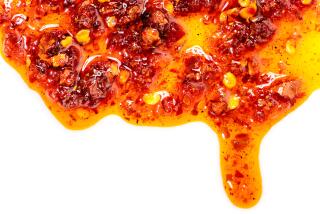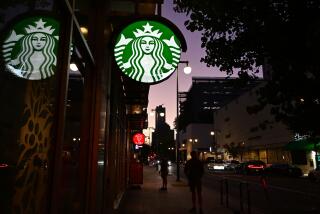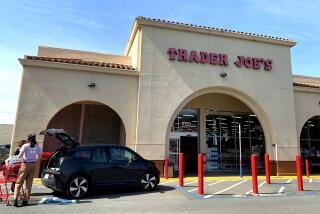Pinkberry serves lawsuits to six frozen yogurt shops
Seeking to freeze out imitators, L.A.-based Pinkberry Inc. filed six lawsuits this week against what it contends are copycat frozen yogurt shops.
Pinkberry is accusing Yoberry in Ft. Lauderdale, Fla.; Yoberry in Washington; Yogiberry in Olney, Md.; Pingo Yogurt in Alhambra; Monkee’s Teriyaki in Venice; and Peachberry in Long Beach and Gardena of deliberately emulating its “highly distinctive branding.”
The businesses were either reproducing Pinkberry’s fruit-shaped swirl logo, duplicating the minimalist layout of its stores or filching parts of its name, said Mark Friedman, the company’s vice president and general counsel.
Some of Pinkberry’s promotional material was doctored with another store’s name, one lawsuit alleges. Another claims that photos belonging to Pinkberry were altered and displayed.
“Our brand and our logo really caught on,” Friedman said. “These businesses are copying Pinkberry’s success in order to ride our tailcoats.”
Ever since Pinkberry opened in 2005, it has developed a cult following with its simple menu of yogurt. Its three flavors -- original, green tea and coffee -- can be paired with assorted toppings such as blueberries, strawberries and coconut flakes.
The privately held company has 65 stores in California and New York.
Pinkberry was on the receiving end of a lawsuit this year filed by customers who contended that the popular treat might not be frozen yogurt. That case was settled in April, with Pinkberry giving $750,000 to two Southern California charities as part of the deal. It also began mixing its yogurt at a dairy, not in-store, and disclosed its ingredients online.
Friedman says he hears about possible knockoffs about four times a week. There’s Pinksweetberry and Razzleberry in Japan, Myberry in France and others in locales including Taiwan, Singapore and Vancouver, Canada, he said.
Imitators are often discovered when customers ask if Pinkberry is affiliated with a similar-looking business, or when people send the company congratulatory notes for opening in an area where Pinkberry has no store, Friedman said.
Until now, Pinkberry has typically sent cease-and-desist letters to rivals that it believed were imitating it. It did file one lawsuit, against Kiwiberry, and won a permanent injunction against that name in May.
My Huynh, owner of Yogiberry in Maryland, said she was slapped with the Pinkberry lawsuit the day after her application to trademark the name of her store was accepted. She said Pinkberry was trying to intimidate smaller businesses.
Earlier in the summer, Pinkberry sent her a letter asking her to change her orange walls, lights and flooring. She repainted the walls black and took her menu off the wall, but refused to make other modifications.
“It’s business -- they have to do what they have to do,” Huynh said. “But I don’t know whether it’s wise for me to fight back, though I want to.”
Yonghee Kim of Monkee’s Teriyaki said he leased his Venice Beach store briefly this summer to an acquaintance, who ran a yogurt business called Coolberry for about a month until it closed in mid-August. Kim, who is named in one of the suits, said his company was uninvolved.
Jack Lerner, an intellectual property professor at USC, said he was not surprised that Pinkberry has taken action.
“It’s a new company, and its unique marks are a big part of its business,” he said. “The question is whether these other stores’ names and the ways the stores are designed create confusion. If they do, these newcomers are going to have a problem.”
Times staff writer Victoria Kim contributed to this report.







